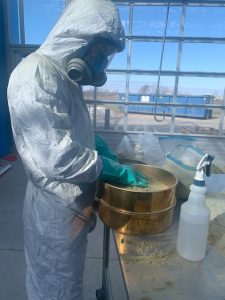Vineland-Grodan recycled stonewool green roof project
Vineland is a member of the Greenhouse Technology Network (GTN), collaborating with small- and medium-sized organizations to advance the development, adoption and implementation of technologies to support the greenhouse industry. Funding is provided by the Federal Economic Development Agency for Southern Ontario to increase innovation capacity and grow the Ontario greenhouse industry.
Greenhouse vegetable production uses a variety of growing substrates to allow for consistent growing along with more efficient uses of resources, i.e. water and nutrients. A challenge for the greenhouse industry and its sustainability footprint is how to divert its production waste from landfills; this includes issues with implementation, logistics, costs and product quality.
Grodan, a manufacturer of stone wool, also known as mineral wool used in commercial greenhouse production, recognized the need to expand current reuse opportunities for its products, and to make these recycling opportunities more readily available in North America.
Yianni Monahan, Product Manager, Lifecycle North America at Grodan, began his career in the recycling and waste world. Yianni realized the most effective way to change how a product is handled and treated in the recycling space is to transform the material from a waste where the producer must pay to remove it, into a commodity where the material can be sold into secondary markets.
Since Yianni previously worked with Darby McGrath, PhD, Vice President, Research & Development at Vineland on similar projects, he brought forward the idea of a research partnership. Darby also saw the need for such a solution and involved the Greenhouse Technology Network in helping to bring support with funding and resources.
“Darby’s team was excellent. They suggested getting GTN involved and suggested a number of objectives so we could really expand the project, resources and outcomes,” said Yianni.
“In this project, we developed substrate blends using recycled stonewool material and validated its application in green roofs and vertical forests, as well as a growing medium for woody perennials in horticultural production. It helps to implement a sustainable end-of-life solution for used stonewool material that aligns with Grodan’s sustainable development policy,” said Darby.
After analyzing different blends and parameters, the team not only determined the used stonewool to be suitable for greenery applications, like green roofs but also found that the final blends with stonewool significantly increased water-holding capacity and substrate performance compared to alternative media such as roof chip tiles and leaf and yard compost.
Vineland’s final white paper illustrated how the chosen substrate blends could meet the FLL Green Roof Guidelines – the leading framework for the planning, construction and maintenance of green roofs presented by the Landscape Development & Landscaping Research Society. This has helped Grodan identify and collaborate with new compost markets across North America.
The next steps are to replicate this small-scale project to commercial-scale and better understand if implementing this opportunity will work in certain markets across North America.
“Being able to partner with a group like Vineland has been so rewarding. When you work with teams, such as Vineland and GTN, with a high level of expertise and technical experience, it makes it easier to ask for funding from senior management,” said Yianni.
For Grodan, sustainability is a key priority. The company recycles about 65 per cent of its stonewool production worldwide, mostly to brick manufacturing industries, compost facilities, industrial bedding and erosion control devices. However, Grodan is seeking to grow this number still; by identifying new markets for its used materials, more and more growers will find opportunities to recycle their greenhouse by-products.
“We have proven through our European markets that recycling stonewool can be an effective component of the greenhouse production lifecycle. In North America, there are more inherent challenges to the waste and recycling space that make our endeavour more challenging. We were excited to partner with Vineland and the GTN in this new study and to address this challenge. It is our hope that this project will provide the foundation for a proof-of-concept in a new recycling market which will only continue to improve the environmental footprint of the industry,” said Yianni.
Grodan has been working with a network of recycling service providers and different markets across North America. This type of project in collaboration with Vineland and GTN helps validate their product, expand their network and grow options for recycling, making it a win-win for all involved.

